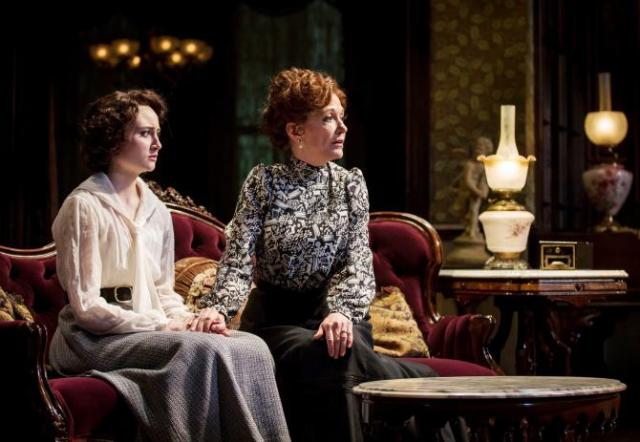

Lillian Hellman never pulled her punches, instead calling out advocates of injustice and inhumanity with a ferocity that made producers nervous, hence the frequent bowdlerization of her more candid dramatic themes (e.g., lesbianism in The Children's Hour).The standard formula for rendering "safe" her microcosmic excoriation of post-bellum morality and greed has been to reduce its heroine to a fairy-tale wicked queen, or to muffle its ethical arguments under a haze of Chekhovian nostalgia.
To be sure, Hellman's The Little Foxes is set at the end of an age—1900, when the former confederate states were chafing under, not only the humiliation of having lost a war, but the devastation of seeing their lands seized and work-force decimated. The Hubbard clan, though, as befitting a family of merchants, see in their neighbors' misfortune an opportunity to expand their dry-goods business.
Younger brother Oscar marries the heiress to a cotton plantation, while sister Regina weds a gentleman with his fortune salted away in investments. The latest scheme involves elder brother Ben inviting a Yankee industrialist to open a textile mill nearby, where the cheap labor often found in depressed economies will expedite processing of the raw product. The catch is that the prospective outsourcer demands a deposit to seal the deal, but Regina's husband Horace is less enthusiastic than his in-laws regarding the potential profit-making venture.
These are not anemic Prozorovs and Ranevskys lamenting a genteel past, but ruthless upstarts who could give the Borgias a run for their money—especially for their money, the undisputed focus of Henry Wishcamper's direction for this Goodman Theater production. Though its emotional level may border on operatic, when the conversation turns to pecuniary matters, the voices of the Hubbard sibs abruptly assume the intractability of cold steel (sometimes in mid-sentence), while the abuse they inflict on others, whether recounted after the fact or occurring right before our eyes, is located full-front or far downstage where we can't pretend to ignore it, however we may look to Todd Rosenthal's museum-accurate deep-south decor for comforting stereotypes.
Wishcamper's dream-team cast is led by Shannon Cochran as a seductively calculating Regina who taunts Ben with her superior height and playfully smacks Oscar on his bald head (echoing the latter's mistreatment of his alcoholic wife), despite the Macchiavellian menace that veteran villains Larry Yando and Steve Pickering exude. John Judd's Horace provides our moral compass, as do Cherene Snow and Dexter Zellicoffer's wise servants and Rae Gray's remarkably mature Alexandra. One-percenters might want to exercise caution departing the theater.
